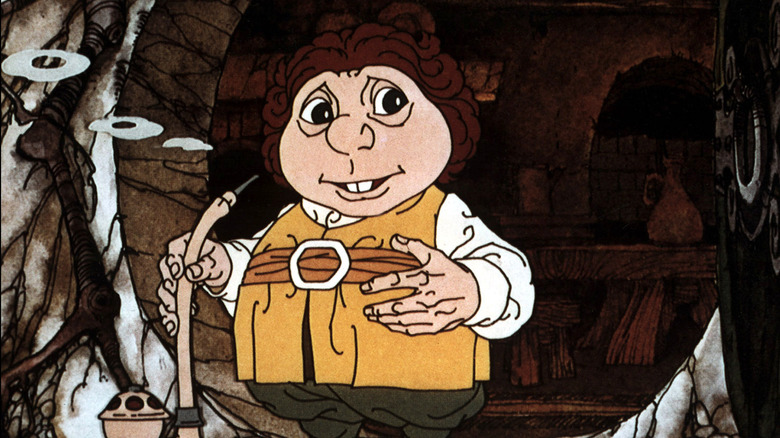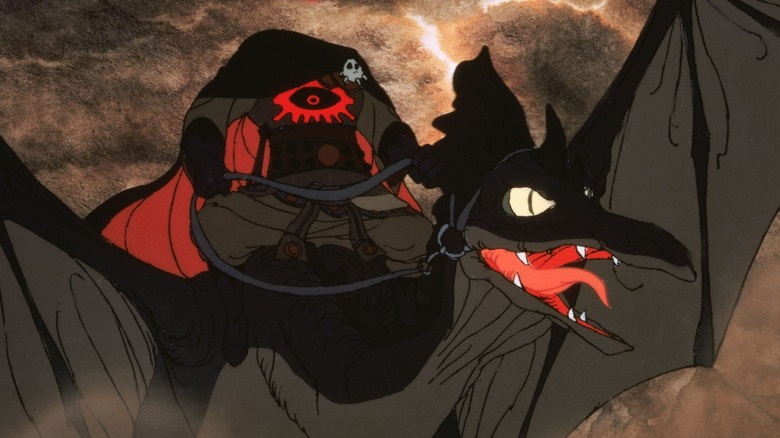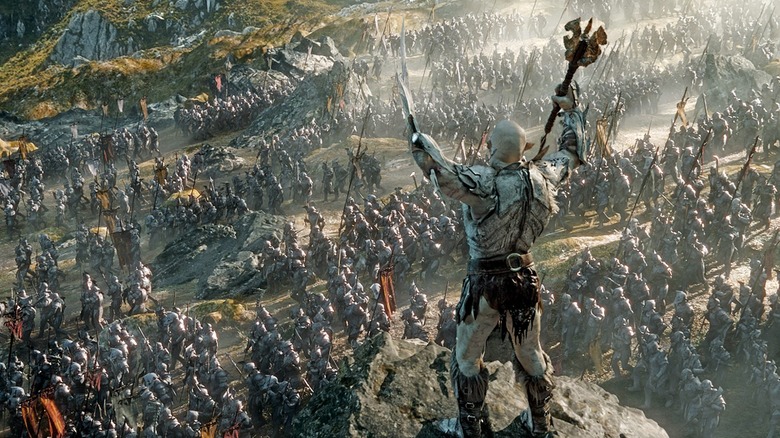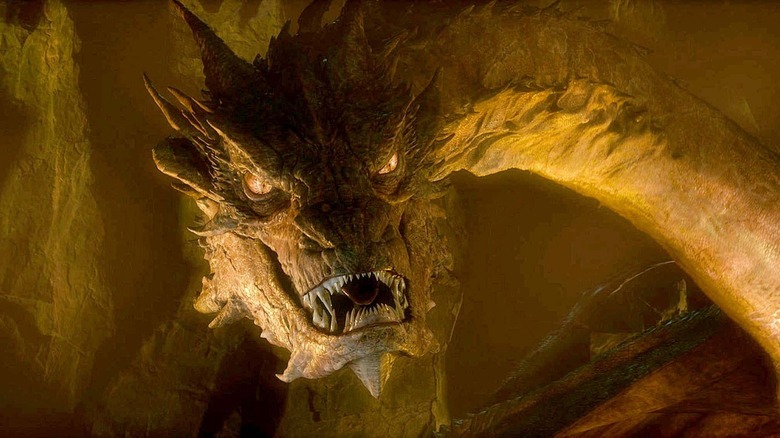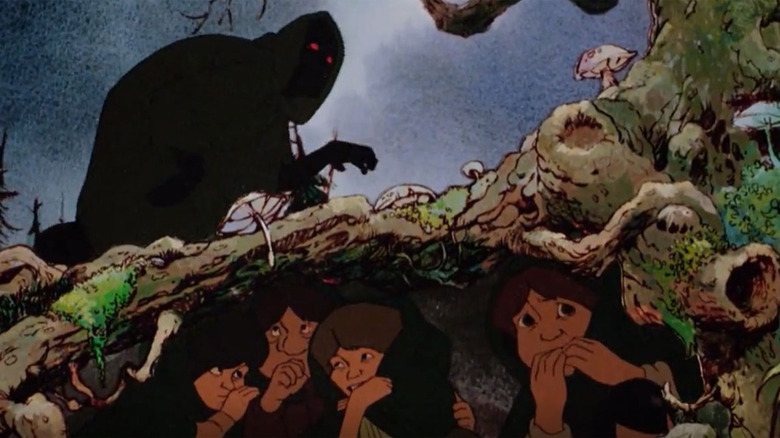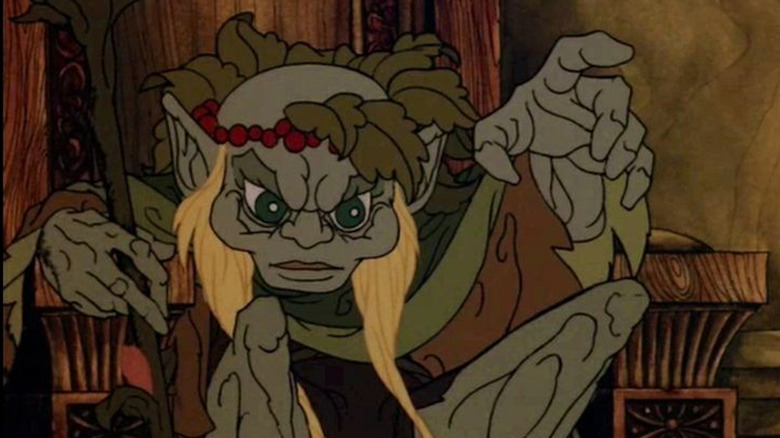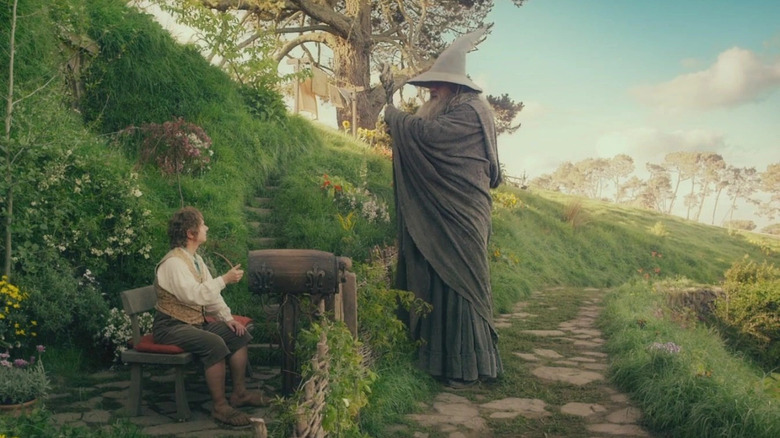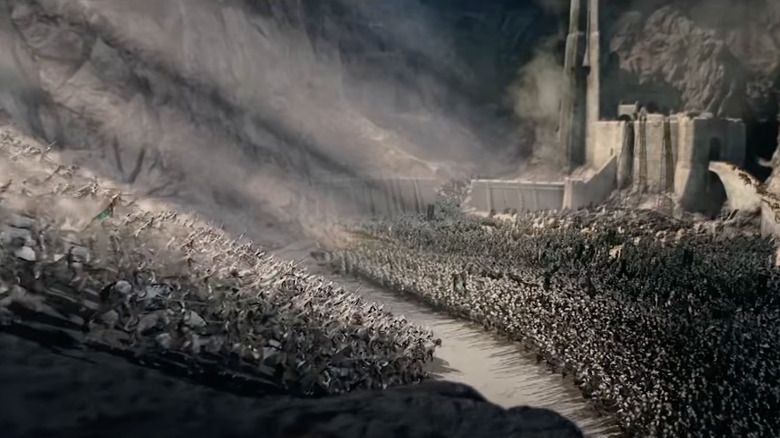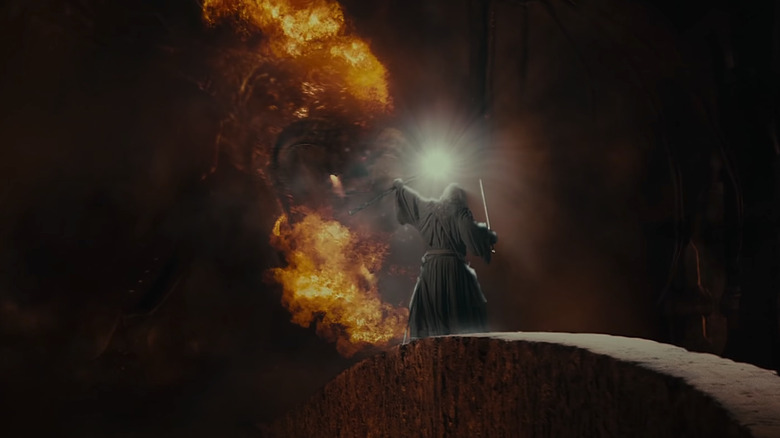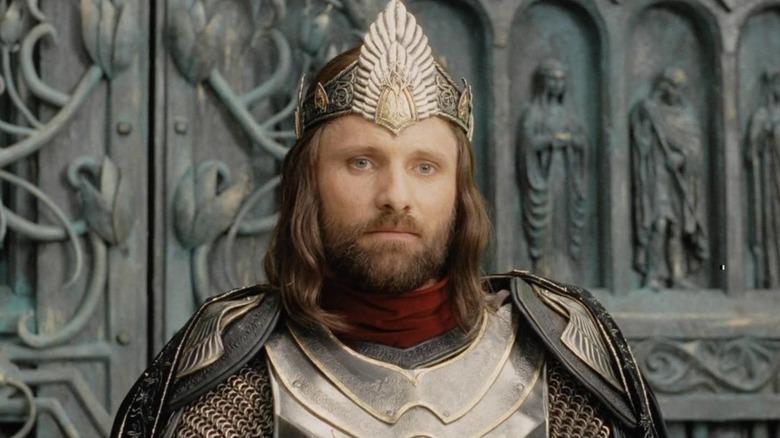Every Lord Of The Rings And Hobbit Movie Ranked
The multi-generational appeal of J.R.R. Tolkien's Middle-earth consistently attracts writers and artists. Multiple adaptation attempts in Hollywood have taken place ever since the author sold the film and merchandising rights to "The Hobbit" and "The Lord of the Rings" back in 1969 for a mere $250,000. Since then, we've gotten television shows, radio programs, games, toys, and of course, multiple movies all set in Middle-earth.
The last item primarily consists of a pair of monumental trilogies helmed by Peter Jackson, but they aren't alone. There have been other mainstream animated adaptations as well as multiple international one-off events (including a pair of bizarre outings adapted for Finnish and Russian audiences). That doesn't even take into account the various fan films out there, along with Amazon Studios' "The Rings of Power" streaming series, Warner Bros.' "The War of the Rohirrim" anime feature, or the studio's string of yet-to-be-revealed projects coming down the pike.
The adaptive process for Tolkien's work has been hot and heavy for a long time. For the purposes of this ranking, we're going to restrict the list to mainstream movies only. That means we're taking into account Jackson's six films and the three animated movies that preceded them. Even so, this is a heady list of cinematic fantasy content with both stand-out and sub-par entries. Let's arbitrarily compare and contrast them against one another (from worst to first) in the name of adaptive excellence and the endlessly fun experience that is Middle-earth.
The Return of the King (animated)
The animated film titled "The Return of the King" is loosely based on the book by the same name. Released in 1980, it was produced by Rankin/Bass as a sequel to that studio's other Middle-earth film — no, not "The Two Towers." It's a direct follow-up to the animated "Hobbit" film — a movie that ranks quite a bit higher on this list.
The reason "The Return of the King" does not follow suit is because, unlike the animated "Hobbit," it's an incomplete, disjointed, and horribly truncated experience. Countless characters are omitted, from Shelob and Saruman to Legolas and Gimli. The story is also crammed into a narrative framing device that starts at the end and consists of a retelling of the original adventure after the fact.
This is interesting, as within J.R.R. Tolkien's original narrative, Frodo does technically write down the "Lord of the Rings" story. The author also has the nine-fingered hero and the other Hobbit adventurers retell their collective tale to Bilbo at the end of "The Return of the King." But in its adapted form, the entire thing feels confusing, even for a diehard fan. It's also worth noting that, technically speaking, the movie is unrelated to the animated "Lord of the Rings" film directed by Ralph Bakshi, even if the two are often loosely lumped together (and the Rankin/Bass project picks up more or less where Bakshi left off). Taken altogether, this makes the animated "The Return of the King" an interesting but sub-par outlier on the greater Tolkien cinematic landscape.
The Hobbit: The Battle of the Five Armies
Peter Jackson, Fran Walsh, and Philippa Boyens are geniuses of adaptation. Their depictions of J.R.R. Tolkien's world are arguably more iconic than the books themselves. But the creative team made a major misstep with the last of their six major films. "The Hobbit: The Battle of the Five Armies" is, in essence, two-and-a-half hours of bad CGI and extended battle sequences. It's got enough low-quality action shots to sate even the most violent, action-hungry palates. For the rest of us, it's just way too much.
The movie starts with the duel between Smaug and the Lake-men, which is all sorts of anti-climactic. (More on that in a minute.) It then proceeds to dive into the battle over the treasure hoard of the Lonely Mountain in excruciating detail. From low-quality shots of Legolas (Orlando Bloom) jumping across falling stone bridges to Thorin (Richard Armitage) suffering dragon sickness to random time-irrelevant journeys through Orc strongholds, there's just no rhyme or reason here.
The one potential saving grace was the possibility of exploring the showdown between the White Council and the Necromancer, but even that ends up being more bark than bite. It has some fun shots of Galadriel being badass and Elrond flashing his sword, but at the end of the day, it just feels like a one-off horror sequence randomly mixed into the normal Middle-earth magic. The entire experience leaves devoted Tolkienites scrambling to make sense of the lore and fair-weather fans just plain confused.
The Hobbit: The Desolation of Smaug
The second film in the "Hobbit" trilogy starts strong with an unexpected flashback to Thorin and Gandalf meeting at The Prancing Pony in Bree (an event depicted in detail in the book "Unfinished Tales"). This cold open provides some fun backstory in a delightfully Jacksonian way, similar to how the director saved Gollum's backstory to start "The Return of the King." After that, though, things go downhill fast.
The biggest issue here is pacing. The movie drags in too many outside factors, like Gandalf's (Ian McKellen) side quest to find the Necromancer, Azog's hunt for Thorin, and the entire Tauriel (Evangeline Lily) storyline. The bewildering plot jumps around too much. This means it also, ultimately, fails to fit in Smaug's epic showdown with Bard (Luke Evans) and the Lake-men, which could have been the middle chapter's climax — an unforgivable failure.
Don't forget all of the changes. This is the movie that shamelessly rips off the Arwen and Aragorn love story with a random romance between the invented Elf Tauriel and the Dwarven royal Kili (Aidan Turner). Smaug ends up in a knock-down, drag-out fight with Thorin and company (something that never happens in the books), which ends up with the dragon nearly drowned in a lake of molten gold. Oh, and they completely retcon the origin of the Nazgûl, too. Yeah, it may start out strong, but the middle "Hobbit" film is a rudderless, confusing, and reckless hot mess when you break it down.
The Lord of the Rings (animated)
This is the most stand-alone film on this list, 1978's "Lord of the Rings" from legendary animator Ralph Bakshi isn't part of a trilogy or even a complete story. It's completely unrelated to both "The Hobbit" and "The Return of the King" animated films, having been created by a different studio. The two-plus hour film is filled with stunning visuals and fascinating adaptive choices.
There are some remarkably faithful moments that stick to the text, and the overall feel and flow of the story are very Tolkienian. However, as is always the case with adaptations, there are also some significant deviations. Legolas (Anthony Daniels), for instance, is the one who shows up to save Frodo (Christopher Guard) from the Black Riders. Characters like Arwen, Éomer, and Faramir are unceremoniously omitted. The simple fact that the movie has a cliffhanger ending that is never finished is proof enough that it could never land too high on a list like this. All the same, there's enough good stuff here to keep it in the middle of the pack.
It's interesting to note that extensive portions of Bakshi's film are nearly shot-for-shot recreated by Peter Jackson — albeit without official acknowledgment. From Hobbits hiding from Black Riders under tree roots to the opening sequences of both movies, there's little doubt that Jackson was, at the least, inspired by this movie as he went about creating his own live-action version.
The Hobbit (animated)
The first ever major Middle-earth adaptation to see the light of day was the Rankin/Bass animated television film "The Hobbit," which came out in 1977, just a handful of years after J.R.R. Tolkien's death. The movie is barely over an hour long, with its meager 77 minutes making it by far the shortest adaptation on this list. Despite its brevity, it is also the most reasonably paced and complete movie up until this point on our list.
Peter Jackson's trio of "Hobbit" films dramatically extend the plot of the 300-page book. Both Bakshi's "The Lord of the Rings" and Rankin/Bass' "The Return of the King" are incomplete to the point of occasional confusion. The animated "Hobbit" stands out due to the simple fact that, from beginning to end, it follows the entire story of the source material.
Don't get us wrong. There are many creative liberties taken along the way, and the specific interpretations are dubious at points (such as the green-skinned, goblin-like Woodland Elves). The film moves along quickly, too. If anything, it overcorrects by cramming too much storyline into too little space. But taken as a whole, it's a remarkable effort that honors the original source material. The fact that it's the first motion picture adaptation with no precedence to build on also makes it an impressive feat in and of itself.
The Hobbit: An Unexpected Journey
The opening salvo for Peter Jackson's "The Hobbit" trilogy was always going to go over well. It was pretty much an automatic win the moment fans saw Gandalf walk up to Bag End to interrupt poor Bilbo's (Martin Freeman) peaceful little world. Jackson channels his Middle-earth magic expertly throughout this movie, immediately pulling viewers back into the on-screen experience he had created. The fact that the film didn't have to finish the story or answer too many questions also made it harder to upset fans looking for the spirit of the source material.
Then there are things like the iconic unexpected party in Bag End, the encounter with the three Trolls, and the visit to Elrond's (Hugo Weaving) Last Homely House. The Riddles in the Dark sequence also features a return of Gollum in the form of Andy Serkis in his Middle-earth motion capture spandex. Take it together, and there was a lot going for this film right out of the gate. Don't forget the fact that we got an Elijah Wood and Ian Holm cameo to kick things off, too.
That's not to say the movie is flawless. On the contrary, it introduces random things like the presence of the Orc chieftain Azog (who should be dead long before this point) and the Wizard Radagast's (Sylvester McCoy) Rhosgobel Rabbits. Still, taken altogether, "The Hobbit: An Unexpected Journey" channels Jackson's Middle-earth touch the best out of the three films in that trilogy.
The Two Towers
From the outset, there was no doubt that Peter Jackson's monumental three-part adaptation of "The Lord of the Rings" was going to top this list. The only real question was how the top three films would be ranked against one another — and "The Two Towers" comes in at the bottom of that trio. The only reason this incredible film comes in last place, though, is because it's sandwiched between an even more epic beginning and ending to one of the greatest fictional stories ever told.
"The Two Towers" has to pick up where "The Fellowship of the Ring" left off, and drops off before the real showdown with Sauron begins. In the interim, the movie stands out on its own merits. We meet Treebeard and the Ents, see the traitor Saruman toppled, and watch Frodo and Sam tame Gollum and make their way to the edge of Mordor. We also get the uber-epic Battle of Helm's Deep, which comes with all sorts of stunning visuals and rain-soaked heroics. We will say, though, that the random insertion of a ton of Elven warriors from Lothlórien (with precisely none of them shown surviving the fight) is one of the more grievous alterations to the original story. Remember, we're nitpicking at this point and every pro or con counts.
The Fellowship of the Ring
There's a serious case to be made that "The Fellowship of the Ring" is the greatest J.R.R. Tolkien adaptation of all time. The movie sets the tone for Middle-earth like no other. It balances down-to-earth Hobbit life with the over-the-top dramatics of the rest of Tolkien's world. The score alone has embedded itself in the hearts and minds of millions of fans. Even Elijah Wood continues to maintain that the movie is his favorite of the trilogy two decades after it was released.
The movie begins with one of the greatest opening sequences ever filmed. The trilogy's prologue encapsulates thousands of years of Middle-earth history with brief, dramatic exposition from Cate Blanchett's Galadriel (largely adapted from Tolkien's own words). It immediately establishes the tone and sets the stage for the story with an efficiency that seems almost impossible for a text so dense.
Throughout the story that follows, we're treated to major showdowns, like Aragorn's (Viggo Mortensen) fight with the Black Riders and Gandalf's duel with the Balrog. We also get to know the Fellowship of the Ring before they're scattered at the end of the film. Even events like Gandalf's revelation to Frodo about the One Ring or the Council of Elrond (which are both protracted, information-dense events in the book) are handled with aplomb and don't lose the audience. The movie dives into a massive story, pulling audiences in and helping them slip into its current without a struggle. It's a cinematic masterpiece.
The Return of the King
Peter Jackson's "The Return of the King" is the man's magnum opus. The movie's extended runtime is a gargantuan 263 minutes. 20 years later, it continues to hold up and maintain an audience's attention from beginning to end.
From the iconic charge of the Rohirrim at the Battle of the Pelennor Fields to the struggle with Shelob and Frodo's violent exchange with Gollum at the Cracks of Doom, this movie is the definition of a climactic third act. To be fair, it still has some major adjustments from the source material. The Army of the Dead, for instance, is given an outsized role, and the hobbits returning home to find the Shire choked by industrialization (an event called "the Scouring of the Shire" in the books) is cut completely.
Even so, the rest of the film flows so seamlessly and completely that it is an easy first-place candidate for a list of this nature. For those still on the fence about whether "The Fellowship of the Ring" or "The Return of the King" should snag the top spot, there's one more element to consider: awards. "The Return of the King" landed 11 of the 17 total Oscars won by the trilogy. It also won every single Oscar for which it received a nomination. The proof is in the pudding, folks — from effects to storyline to peer-reviewed stamps of approval, this is hands-down the best Middle-earth movie of all time.
